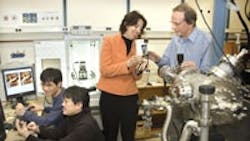While research continues around the globe to find alternatives to fossil fuels for vehicle applications (see "Fuel Cells In The Warehouse" for one such example), scientists at Brookhaven National Laboratory say they have made progress in solving one major impediment to the use of fuel cells -- the degradation of platinum in stop-and-go applications.
Platinum, an efficient electrocatalyst for accelerating chemical reactions in fuel cells, degrades over time, reducing its effectiveness as a catalyst. However, under lab conditions that mimic a fuel cell environment, researchers at the Department of Energy laboratory have discovered a method to overcome this problem. Their technique? The addition of gold clusters to the platinum electrocatalyst.
"Promising possibilities" is how researcher Radoslav Adzic describes the scientists' discovery. The next step: to reproduce the results in real fuel cells.
See Also
About the Author
Jill Jusko
Bio: Jill Jusko is executive editor for IndustryWeek. She has been writing about manufacturing operations leadership for more than 20 years. Her coverage spotlights companies that are in pursuit of world-class results in quality, productivity, cost and other benchmarks by implementing the latest continuous improvement and lean/Six-Sigma strategies. Jill also coordinates IndustryWeek’s Best Plants Awards Program, which annually salutes the leading manufacturing facilities in North America.
Have a story idea? Send it to [email protected].

